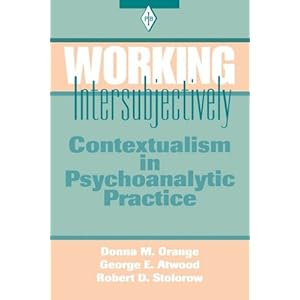Dr. Stolorow is one of the founders of the intersubjective school of psychoanalysis - which makes him very cool in my world - but he is also a leader in the philosophy of psychotherapy. He has some , serious doubts about the usefulness of evidence-based practice in psychotherapy, and rightfully so.
The evidence-based models all ignore or deny the importance and the uniqueness of each therapeutic dyad - it's the relational aspects of therapy where healing occurs, the rest is just building skills and changing behaviors.
Show Me the Evidence!
These days, in this Insurance-Company-Driven Age of the Quick Fix, there is much talk in psychotherapy circles of “Evidence-Based Practice.” The application of this slogan has been remarkably devoid of philosophical questioning of the nature of psychotherapeutic practice or of the proper evidence for guiding the therapeutic approach to a suffering human soul.
My collaborators and I (Working Intersubjectively: Contextualism in Psychoanalytic Practice (Psychoanalytic Inquiry Book Series) - with Donna Orange and George Atwood) have applied the Aristotelian distinction between techne and phronesis to the practice of psychoanalytic therapy. Techne or technical rationality is the kind of method and knowledge required for the uniform production of things. It is exemplified in the traditional, standardized rules of psychoanalytic technique, especially as these are claimed to apply for all patients, all analysts, all analytic couples, and all relational situations. We argue “that the whole conception of psychoanalysis as technique is wrongheaded … and needs to be rethought” (p. 21). We further suggest that what is needed to ground psychoanalytic practice is not techne but phronesis or practical wisdom. Unlike techne, phronesis is a form of practical understanding that is always oriented to the particular, to the uniqueness of the individual and his or her relational situation.
Traditional psychotherapy research tends to reduce human beings and human relationships to “variables” that can be measured, calculated, and correlated. Such procedures partake of what Heidegger calls the technological way of being or technological form of intelligibility. According to Heidegger, entities as a whole, including human beings, are intelligible in our technological era as meaningless resources to be calculated, stored, and optimized in the quest to conquer the earth. In my view, the technological way of being is also associated with the philosophical stance of scientism—the presupposition, exemplified in the scientific positivism characteristic of much research on change in psychotherapy, that the chief form of valid knowledge is that attained through experimental and quantitative methodology.
Such considerations point to the potential importance of qualitative, rather than quantitative, research. They also bring me back to a tradition in academic personality psychology—the tradition in which I was trained as a clinical psychology doctoral student at Harvard during the mid- and late 1960s—known as personology. This tradition, founded by Henry Murray at the Harvard Psychological Clinic in the 1930s, held as its basic premise the claim that knowledge of human personality can be advanced only by the systematic, in-depth study of the individual person. This emphasis on “idiographic,” rather than “nomothetic,” research was a radical departure from the philosophy of science that then dominated, and has continued to dominate, academic psychology in the United States.
I suggest that grasping the practice of psychotherapy as a form of phronesis rather than techne justifies a return to idiographic methods in studies of the psychotherapeutic relationship—methods that can investigate the unique emotional worlds of patient and psychotherapist and the specific intersubjective systems constituted by the interplay between them. It is only such idiographic research, I contend, that can illuminate the rich, complex, living relational nexus in which the psychotherapeutic process takes form.

No comments:
Post a Comment